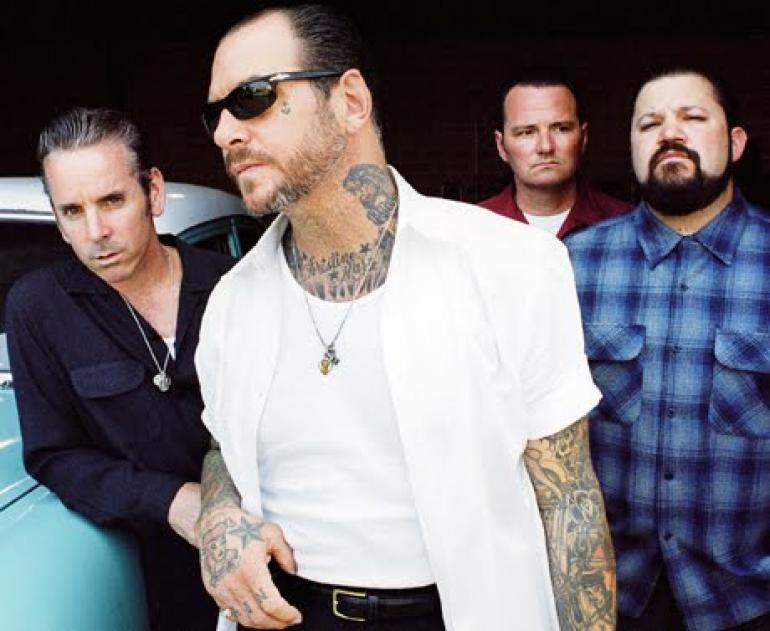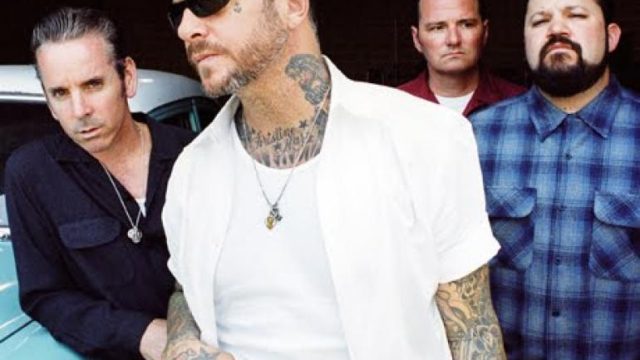By Jim Morrison
Mike Ness formed Social Distortion in Orange County in 1978 and it took more than a decade before the band hit the big time with their self-titled debut featuring “Ball & Chain.”
They’ve never been prolific — just three albums in the last two decades — but Ness has been a survivor, outlasting drugs and alcohol and band lineup changes, including the death of guitarist Dennis Danell.
Listen to the lyrics of “Ball & Chain” after all these years and it’s clear Ness, while labeled a punk rocker, has plenty of Woody and Chuck in him. He’s a rocker, period. He’s also a sober vegetarian these days, still wearing his passion boldly. Ness was not available for an interview. Here are some of his recent musings. Social Distortion plays The NorVa on Aug. 15.
What about a New Album?
The last Social Distortion album, “Hard Times and Nursery Rhymes,” was released in 2011. There’s a new one on the way…maybe.
“I’ve been reading and writing, and kind of wrapping my mind around the self-imposed challenge that I’ve put on myself: that I’ve got to write the record of my career. So I’ve got to raise the bar,” Ness said earlier this year. “That’s just something that I put on myself because I don’t like to just go, ‘Time to put out another record’ and go through the motions.
“I mean, yeah, we might have enough songs right now. But I want to see what can happen over the next six months. Can I outdo this? What direction do I want to go in? What do I want to say?”
The First Album? He’s Forgotten
“I don’t even remember making that record (“Mommy’s Little Monster”). It was just a blackout,” he said. “But I recently watched the film ‘Another State of Mind’ and I still write the same way — alone with an acoustic guitar. Even though we’ve evolved musically and lyrically, a lot of things have stayed just the same.”
First Came Addiction; Success Followed Sobriety
“I was addicted to drugs and alcohol before I had any success with the band. I wasn’t shooting dope at the St. Regis Hotel or in the back of a limousine. I started at the bottom and ended up getting even lower. So for me, that actually helped me. Because of my painful childhood, it wasn’t easy for me to keep going on and it put me in a very lonely situation. So that just kind of puts you in a desperate position where you’re willing to try something new.”
“As far as staying clean all this time, it’s just been keeping in the forefront of my mind that I could go back to that at any moment, and I know the disease progresses. So, to be doing what I was doing back then now, if I didn’t die, it would be going to prison, and I’m just not willing to do that at this juncture in my life.”
From Painting Houses to Major-Label Star with “Social Distortion” in 1990
“For me, personally, it was taking some risks,” he said about their breakthrough, which landed them on the charts for the first time. “The songs I was writing at the time were not your typical punk-rock songs. I wanted to bridge genres and styles, and I didn’t want to just play in front of one particular crowd. From my early experience with the first wave of punk, I thought it was supposed to be very diverse and individual, but by the mid-‘80s, the bands frankly started to sound the same.
“Pretty much every band’s dream is to sign to a major label — at the time I was painting houses for a living — quit the day job and devote all your time and energy to what you love, music. In that aspect, it was great. Now, we can get out and tour the country and more people can see us. We’re getting regular airplay, more people would hear us.”
“But it just wasn’t financially the best situation for a band to be on a major label where they’re fighting everything and you’re constantly going into debt with them. It worked for a while, but when it was time to renegotiate, we really figured out that they weren’t doing anything for us we weren’t doing for ourselves. And it was very liberating to just go back to the do-it-yourself way with which we started the band.”
That Cover of “Ring of Fire:”
“I remember getting a lot of slack for that. It was the punk-rock police, like, “Oh, it’s not very ‘punk rock’ if you’re covering that country song.” But we had covered Johnny Cash songs as early as 1983, so it was really nothing new for us.”
WANT TO GO?
Social Distortion
August 15
The NorVa





